Children on Shipboard - 1914
It was thought that an ocean-going ship was a bad place for children, and parents made their voyages without the little ones when possible. But these days, everything is done for the comfort and entertainment of the children, and even a long sea voyage may be of great educational value.
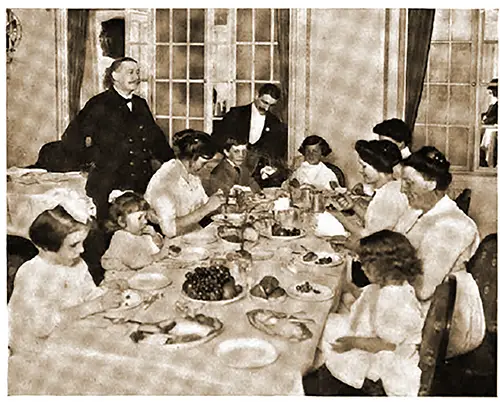
In the Children’s Dining Room on Board a Steamship. Harper's Bazar, January 1914. | GGA Image ID # 15ed436b1c
On the modern ship, every arrangement is made for the comfort and pleasure of children. Boys and girls have their dining rooms, special food and milk supply, playrooms, and deck games.
A stewardess is engaged to look after the little girls, and an old salt, gentle and resourceful like Masterman Ready (Note 1), is detailed from the sailor crew to watch over the boys. Both stewardesses and sailors arrange games for the children in the playrooms when the weather is rough on deck or when they tire of roaming about the ship.
The Little Rich Boy Who Got Lost
Children are so well cared for on liners like the Olympic, the Mauretania, the Imperator, and the George Washington, including the ships to the Mediterranean and South American ports, that fathers and mothers no longer object to taking them along. Indeed, a better education can be gotten this way than from school books.
Sometimes, youngsters give parents terrible frights by getting lost on the big ships, but they are usually found in an unfrequented spot, busily engaged in asking questions of a member of the crew.
It was so with one little boy who persuaded his mates to play at being pirates and got himself elected chief pirate. The crew was supposed to be shipwrecked, and, as chief, he searched for another ship.
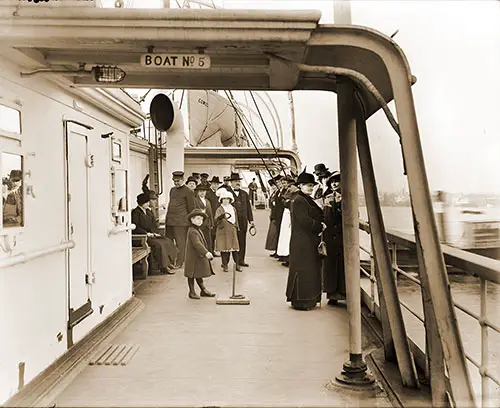
Children Playing Quoits on Deck of Steamer Comus, 1900. Detroit Publishing Company. | GGA Image ID # 2010c6df2c
When he did not come back, the other children quit playing. An hour passed, and he did not appear. By ten o'clock at night, the whole ship was astir. It was feared he had fallen overboard, and his mother became hysterical.
She besought the captain to help find her boy. Though cheerily reassuring, even he was gravely disturbed. At eight bells (midnight), the new watch was sent to look for the boy.
After a time, the fog lifted, and in the moonlight, the lookout saw the boy fast asleep, nestling under the forward side of the high steel breakwater.
The bubbling, irresistible spirit of childhood is seldom marred by sea sickness. During an early Spring tour to the Mediterranean, a young dandy, occupied in a desperate flirtation, lost the goodwill of the boys and girls on board.
He was wont to seek the quiet, shadowy comers of the ship with the girl and more than once scolded the children for getting in the way. He dubbed the frolicking children a bande noire.
So the children, wise in their way, spied on the couple. One afternoon, while tea was being served, some dozen youngsters broke in upon a group of grown-ups.
"Mama, Johnny saw something dreadful last night," began a little girl impressively.
"What, dear?" asked the unsuspecting mother.
"You tell," said the little girl, pushing Johnny to the front. Johnny, all primed, pointed an accusing finger at the dandy.
"He kissed Miss Elizabeth. We saw him."
After spending a mortified day in their cabins, the flirtatious pair made friends with the children and used their games as an excuse to be together.
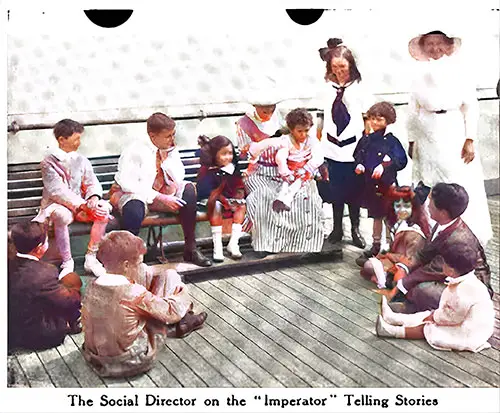
The Social Director on the “Imperator” Telling Stories. Harper's Bazar, January 1914. | GGA Image ID # 15ed66f023
Another group of youngsters, the little brothers and sisters of a big sister, thought to correct her affectation of superiority. They crept out of bed early one morning, went to the promenade deck, and secured possession of the canvas bucket the quartermaster used to dip into the sea to take its temperature.
Filling it with ice-cold sea water, they carefully counted the ports until they reached that of the big sister's cabin. With a swift swing, the bucket was sent into the cabin, its contents spilled and quickly withdrawn. Then, they fled back to bed.
Directly, a half-shaved, half-dressed, and very wet man, noted for his courtly manners, ran upon the deck, demanding to know what sailor had dared to throw water into his cabin.
A deck steward came, then the chief steward. The man was so angry that the deck officer came and tried to explain that a stray wave had doubtless splashed him. "But I saw the bucket!" cried the irate man.
The investigation that followed yielded no information. But the children knew. They had counted the ports correctly but on the wrong side of the ship.
On the long cruises, the children see the most and have the most fun.
They get used to the ship and settle into shipways. The trips to Central and South America in winter are exciting, not only because of the queer ports and luxuriant tropic vegetation but because of the strange animals that are to be seen.
Sometimes, the children become so infatuated with ship-board life on these cruises that they let their elders do all the shore tramping. One boy fell so in love at Havana with the steam launch of the SS Victoria Luise, used for towing the row-boats full of passengers to and from, that he spent all of his waking hours therein. Not once could he be persuaded to go ashore himself.
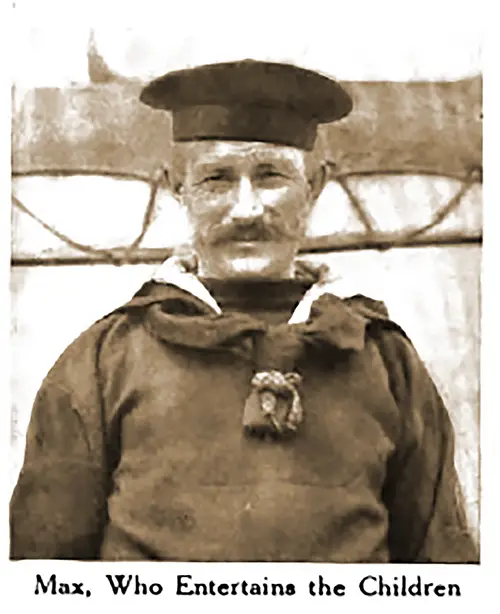
Max, Who Entertains the Children on the Ship. Harper's Bazar, January 1914. | GGA Image ID # 15ed7a13f0
The Rivals
A genuinely pleasing side to these sea voyages, whether to South America, around the world, on the swift liners, or the slower boats across the Atlantic, lies in the sturdy friendships that now and then spring up between the children and the ship's officers.
Captain Le Vedher of the Caroline is a quaint, sprightly bachelor who loves children with all his heart. On one voyage, I remember that Lie and his dear friend, the ship's doctor, who was also a bachelor, took such a fancy to a merry little boy that they became jealous of each other.
The captain's imposing uniform and bridge machinery interested the boy, but again, the doctor had a tempting kind of bonbon in his medicine chest that he gave the boy in the guise of medicine.
One day, when the doctor seemed to be gaining ground, he discovered that his store of bonbons was missing. He went to report to the captain that someone had dared steal from him.
He found Captain Le Vedher walking up and down with the boy. The boy hung on to one of the captain's huge fingers with one hand; in his other hand, the missing bonbons were clasped. The captain had purloined them.
"Look at him," complained the defeated doctor to the mother, "making your boy sick with candy!"
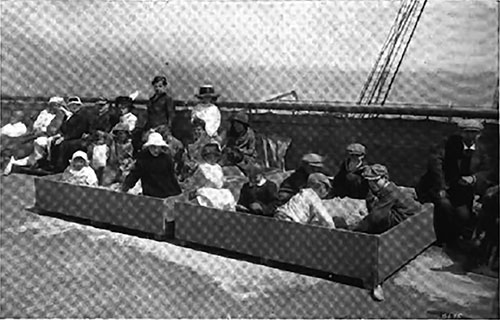
The Sand-Pile (Sandboxes) on an Ocean Liner. Harper's Bazar, January 1914. | GGA Image ID # 15ed99779b
End Notes
- One of Captain Marryat's popular illustrated naval novels, this exciting tale "Masterman Ready" is complete in three volumes. Captain Marryat's popular children's novel follows the adventures of a shipwrecked family trying to survive on a desert island. Each volume is illustrated with a frontispiece and in-text illustrations. Marryat was a Royal Navy officer best known for his novel "Mr. Midshipman Easy."
Walter S. Hiatt, "Children on Shipboard," in Harper's Bazar, New York: Harper's Bazar, Inc., Vol. XLIX, No. 1, January 1914. p.86.
